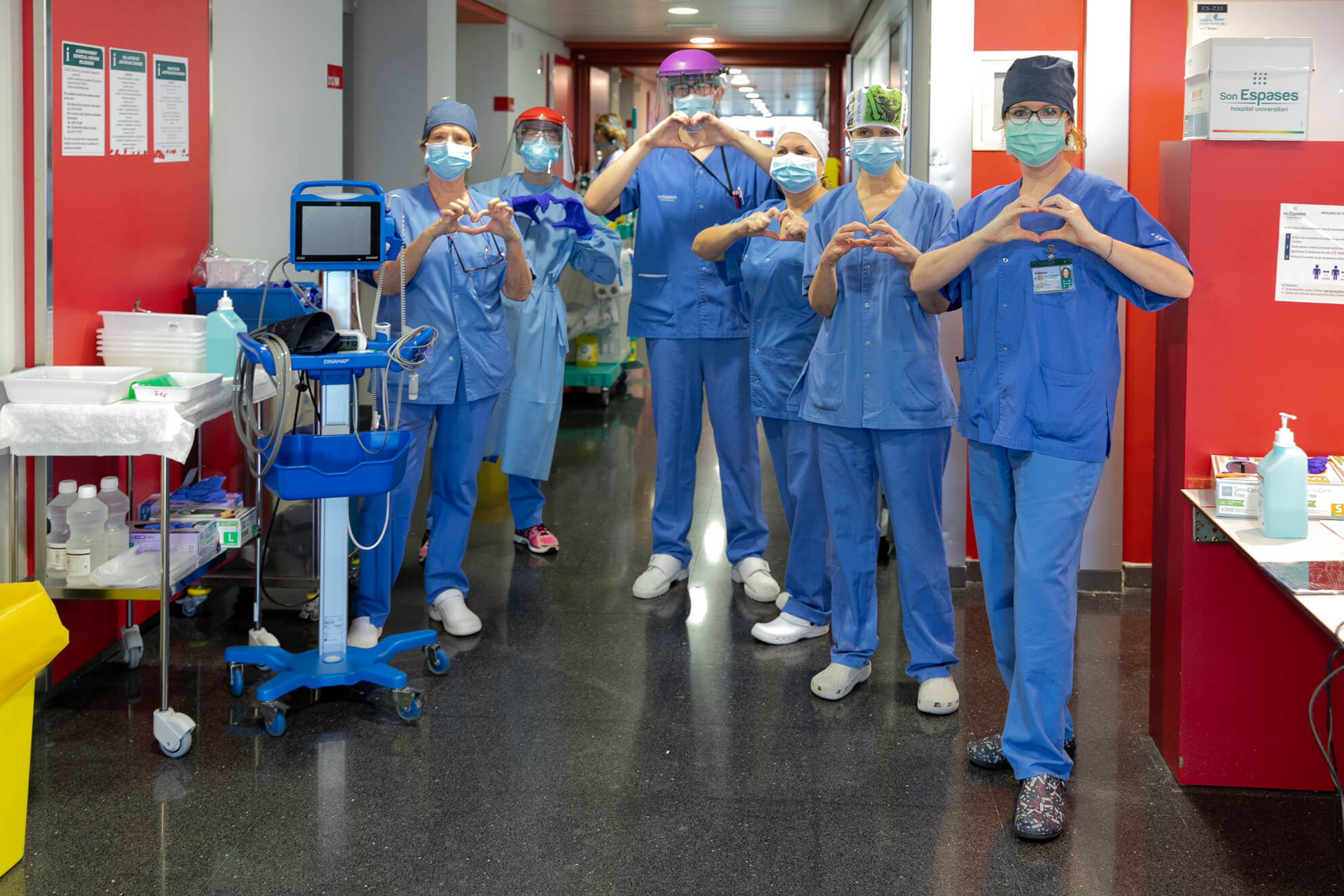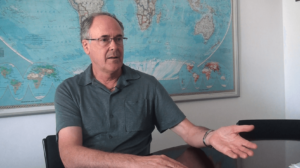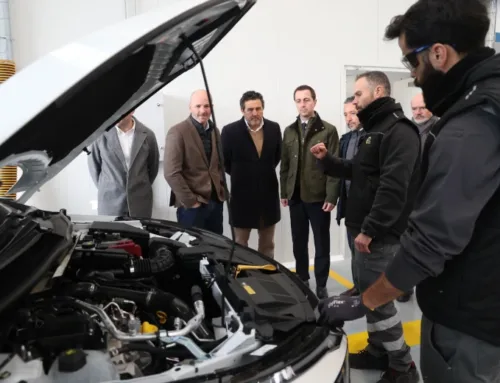Despite the fact that Spain has suffered the worst incidence of COVID-19 in Europe at certain times of the pandemic, most of the scientists consulted by Mallorca Global maintain that the Spanish public health system is still one of the best in the world and blame the shortcomings highlighted by the health crisis mainly on the budget cuts. Since 2009, the year of the swine flu pandemic, the public health coffers have not had any joy, quite the contrary, they have suffered an unjustified impoverishment that now explains the cracks in the health structure.
Text: J. E. Iglesias.

Health workers, on the front line against COVID-19. Photo: HUSE
Both Ildefonso Hernández, professor of Public Health and general director of the Ministry of Health between 2008 and 2011, from whose position he directed the fight against swine flu in 2009, along with the leading scientist in infectious diseases and collaborator of the World Health Organization (WHO) Sebastián Crespí or the head of Primary Care Research in the Balearic Islands, Joan Llobera, ratify the budget stinginess of public health in recent years.
Crespí adds another handicap that has caused strong tensions in the system: “The wild relocation of essential health supplies production -from masks to ventilators, through testing capacity or vaccine production- has left us unprotected when we needed it most”.
Joan Llobera clarifies that in the first wave “it was not acted with the necessary speed, although the measures were effective. The Balearic Islands had good indicators in the months of March and April due to movement restrictions, an obvious example that had the harsh lockdown measures been taken earlier, Spain would have had better indicators and the public health system would not have been as collapsed.
Ildefonso Hernández envisions three reasons for the bad data in Spain after the de-escalation: the high mortality rate in residences, as a fundamental.
- Ildefonso Hernández
- Joan Llobera
A double circuit of patients on the islands
As head of research at the forefront of public health, Llobera unravels the response to the pandemic on the islands: “To avoid contagion, a double circuit of patients had to be created: those who are possibly infectious and patients with other health problems, avoiding direct attention to the maximum. Due to the needs of the centers, the attention to the quota patients of each doctor/nurse was eliminated. The measure, justified at first, has had undesirable effects. Telephone assistance from a professional who is not your reference implies a loss of continuity in care, hinders clinical decision-making and poses a greater risk to patient safety. The stress that primary care professionals endure is enormous and the fatigue and weariness they suffer is logical”.
“Since this year we are doubling the number of doctors and nurses in specialized training in family and community care in the Balearic Islands, but we will not notice their impact for another four years”, he adds.
Consequences on regular health activity
This frenetic activity that health professionals have had in these months with COVID emergencies has displaced the usual activity of health centers, outpatient clinics and hospitals. If not collapsed, the system has faced an unusual work volume that is noticeable in the day-to-day agenda. “The effects of delays in care are beginning to show,” Llobera continues, “because the patient did not attend or it was not easier for him to go to health services. The consequences and excess mortality caused by the COVID-19 crisis and especially the psychological consequences derived from the pandemic have yet to be assessed”.

Sebastián Crespí adds that “the health crisis is of enormous magnitude and it is logical that a good part of the resources are destined right now to this emergency situation. Coronavirus infections may have overshadowed other pathologies attention. We will have to be very careful so that this does not happen in the future. Paradoxically, it is also probable that the pandemic has brought some unexpected benefit, such as the reduction of other respiratory infections”.
Caught off guard
“Before the pandemic, we tried to orient the health system towards attention to chronic problems, which was the dominant pattern of population aging”, explains Joan Llobera. “The infectious diseases and epidemiology services were dimensioned to monitor hospital infections or small outbreaks such as food. It is obvious that the epidemiological surveillance and public health systems in general must improve and have a structure adaptable to sudden changes without the rigidities of civil service regimes.
Had the Public Health Agency, which is advertised in law, developed, perhaps we would have dealt better with the pandemic. It caught us off guard”. Hernández agrees on the urgency of the creation of the Public Health Agency and calls for another “health technology evaluation that tells us which health and non-health technologies are the most efficient. Both agencies must be separated, because whenever they mix, public health is diluted. We would end up as usual, making thousands of cats scans that are useless”.
The hum of the pandemic
“It is curious what has happened”, continues the Public Health professor, because all the experts spoke of the possibilities that we would have a pandemic, but that it would be a mutation, in fact in 2009 we had that experience [swine flu] that fortunately was not so important. That puts us facing the failures of entrusting everything to science and not providing resources. We have been slow in research responses and in fact we still are. In the epidemiological part, we have not dedicated enough resources to investigating transmission chains and now we are not even able to say which part of the transmission is attributable to what type of activity. As this research does not produce anything to patent, but only knowledge to act, it does not have a private company behind it to do it. And it has to be a response from the public administrations… That should make us think about how much to invest and how much taxes to pay in order to have security from state structures”.
Hernández rejects that the central government’s coordination of the COVID-19 response has been erratic. “At the beginning of the pandemic, only coordination and general containment measures were centralized, but not health decisions. The ones who decided to hire or not, or modifying their autonomous policy, were still the autonomous governments. I mean to prepare for the de-escalation, to dedicate the money that came from the State to health or other things. What has been done is for each community to contextualize the measures with their environment”.
The expert criticizes the attitude of the Community of Madrid in its confrontation with the Government: “The forms of federal government are not made for political irresponsibility, but for politics that try to solve problems. This is a chronic issue in our country, the continuous institutional disloyalty of both some governments and some parties make it difficult to do well executed federal work. Sebastián Crespí stresses on the same, but in a different way: “I hope that, as a society, we will be able to overcome partisan obstacles and we will all row in the same direction to achieve it”.
Response plans for any eventuality
For future crises, the former Health General Director calls for investment in health security, because “we need to have response plans for any eventuality or crisis, plans in which all administrations are involved because there may be problems of a nuclear, chemical, and infectious nature or related to climate change”. In addition, it is committed to a change in public health services.
“Until today we have not had a health policy worthy of the name. The rescue of sick people has been prioritized, that it is good to have a system that heals people, but it would be foolish to think that people do not get sick, which implies having to prevent people from having cancer, vascular or chronic cardiorespiratory diseases. And for that, there are public health policies”.
“It’s not so much about ‘how much’ but about ‘what’. For example, there are situations in which the population is unnecessarily medicalized. The health service does not provide benefits in an area such as mental health, which must provide them, and it does not provide benefits in the area of community reinforcement for people with problems. The debate that needs to be done is what kind of responses to health problems Spanish society wants to give”.









Leave A Comment